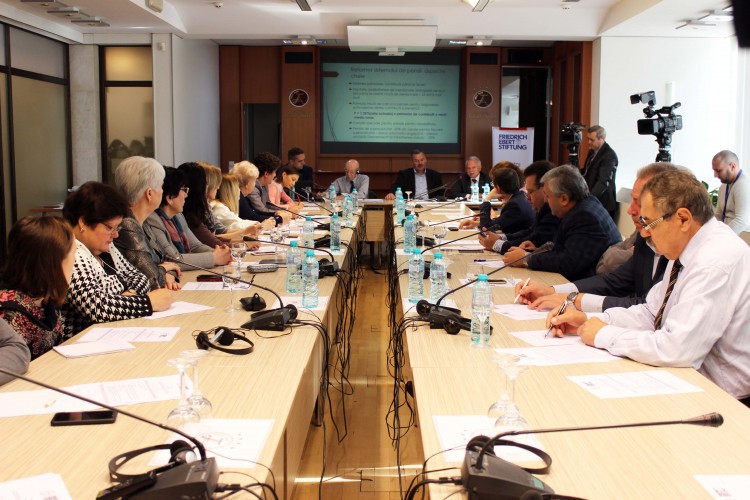The reform of the pension system of the Republic of Moldova was discussed at a round table
Around 90 deputies, local public servants and representatives of civil society, gathered in Chisinau on 3 – 4 October at the conference “Deputies for Gender Equality and Women Empowerment” to identify solutions that would contribute to promote and defend women’s rights and to actively participate in public and political life.
The National Trade Union Confederation of Moldova (CNSM) was represented at this conference by Liuba Rotaru, President of the CNSM Women’s Council.
The conference was organized by the United Nations Development Program, the United Nations Entity for Gender Equality and Empowerment of Women and the OSCE Office for Democratic Institutions and Human Rights, with the support of the Parliament of the Republic of Moldova and in partnership with the Swedish Government.
The conference provides a forum for sharing best practices on promoting women’s participation in public life and developing policies that take into account the specific experiences and needs of women and men.
According to the organizers, despite some successes, limited progress has been made in terms of women’s participation in parliaments and the adoption of laws to effectively promote gender equality and empower women in Eastern European and Central Asian countries. Thus, only about 20% of the deputies are women and only 15% of women are elected to leadership positions within the public administration. In order to make progress, according to the sustainable development commitments up to 2030, states should take concrete actions to increase the number of women in decision-making positions.
Liuba Rotaru, president of the CNSM Women’s Council, said that during two days, the participants reported that important efforts are being made in most countries to implement effective mechanisms in the field of gender policies, protection of women’s rights, stopping migration and other topics.
“On October 3, we had a meeting with representatives of the Moldovan Parliament to discuss the local realities. The role of women’s trade unionists is crucial in implementing national women’s policies. We have similar goals and we must have a common policy in removing women’s discrimination, domestic violence, and abuses against women at work. We will work in groups and we will develop proposals that will be found in an action plan to improve the situation”, informed the president of the CNSM Women’s Council.
Liuba Rotaru also stressed the contribution of the CNSM leadership in the process of promoting women’s rights and mentioned the need to organize information activities, especially in rural areas, in order for women to know their rights better.
In this context, Signe Burgstaller, Sweden’s Ambassador to Moldova, mentioned that this conference offers an exceptional and unique opportunity to share experience on how Parliaments can carry out their representative, legislative and supervisory functions so as to advance gender equality.
Department of Mass Media and International Relations of CNSM



